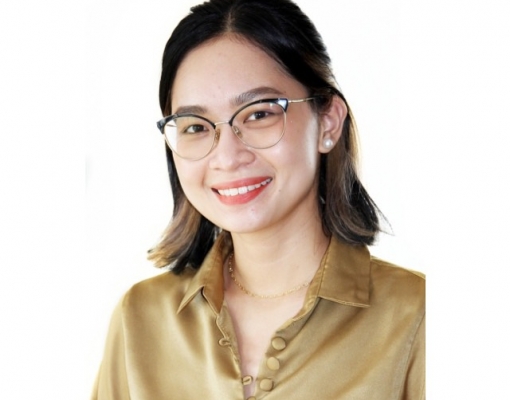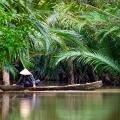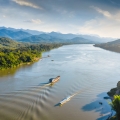Podcast – Water politics, not politicization: Negotiating transboundary water governance in the Mekong River Basin
This podcast episode with Dr. Anoulak Kittikhoun, former CEO of the Mekong River Commission (MRC) Secretariat, unpacks the challenges and approaches of the MRC for transboundary water governance of the vital Mekong River Basin upon which millions depend for their livelihoods.
This podcast episode is part of the SEI Asia series on “Environment and Policy in Asia.” This episode was supported by SEI Asia’s Mekong Think Tanks Program.
Click here to listen.

Among the world’s great river basins, the Mekong River Basin poses one of the most complex challenges for transboundary water governance, given its scale, diversity and politics. Millions of people across Southeast Asia, both within and outside the basin, depend on its ecosystems and resources for their lives and livelihoods.
Established to sustainably manage the shared water resources of the basin, the work of the intergovermental Mekong River Commission (MRC) began in the 1950s with cooperation efforts that were eventually formalized in the Mekong Agreement, signed in 1995 among the four Lower Mekong Basin countries of Cambodia, Lao PDR, Thailand and Vietnam. These efforts took place within the larger context of the end to the US war in the region and the desire of regional governments for peace and stability.
Dr. Anoulak Kittikhoun recently stepped down as CEO of the MRC Secretariat – the operational arm of the MRC based in Vientiane, Lao PDR – after his three-year term ended in 2024. His tenure at the MRC spanned more than a decade, during which he learnt about and grappled with transboundary water governance in the context of the multifaceted, and often competing, political and economic interests of the four member countries – Cambodia, Lao PDR, Thailand and Vietnam – while being shadowed by the influential upstream presence of China.
He explains that “the MRC is a great organization, but it’s a complex organization. You know, the organization is made of four member countries… different sizes, different geographical locations, and different stages of development, which naturally invites complex and different interests in terms of using the water resources.”
Being CEO of the MRC brings with it some unique challenges, as he notes:
The CEO is the one who is, I guess, part diplomat, part science expert, facilitator and leader of this arm of the Commission.
The Mekong Basin’s existential threats
As the largest river in Southeast Asia and the second most biodiverse globally, the Mekong River is often described as the lifeblood of the region, supporting millions of people through fisheries, agriculture and energy production. Dr. Anoulak notes, however, that “all of this is under a lot of pressure because of economic growth for the past decades.”
Read more: https://www.sei.org/features/podcast-water-politics-not-politicization-mekong-river-basin/
===============================================================================================
Episode host: Rajesh Daniel
Sound editing: My Le
Artwork: Alyzza Albay
Series producers: Charmaine Caparas, Rajesh Daniel and Variya Plungwatana
Listen to this episode on available channels:
SEI Asia’s podcast series "Environment and Policy in Asia" focuses on current and critical environmental challenges in Asia and emphasizes policy actions.
The podcast encourages dialogue on policy and practice about sustainable development in Asia. The podcast series aims to provide a platform for Asia Centre’s researchers to highlight their work, with the communications team as the host.
*Photo: The Xiaowan dam in upstream Mekong (Lancang) River, China. The Mekong Basin faces significant power imbalances, with China controlling the upstream and Vietnam heavily dependent on downstream flows particularly for the Mekong Delta. Photo: Manos Fikaris / Getty Images.
Info
This story is part of the following project
Mekong Thought Leadership and Think Tanks Network
Topic
Country
Related people
You might be interested in
-
Grants open for research linking to policy action under Mekong Thought Leadership and Think Tanks Network Program
Mekong Thought Leadership and Think Tanks (MTT) Network Program calls for applications to its research-to-policy grants supporting evidence-based research that connects to practical solutions to challenges in the water-energy-climate nexus.
![Grants open for research linking to policy action under Mekong Thought Leadership and Think Tanks Network Program]()
-
Now open: fellowship opportunities under Mekong Thought Leadership and Think Tanks Program
MTT Program is opening a call for fellowships to be hosted in Cambodia, Lao PDR, Thailand, and Vietnam. The Program will award up to 13 high-quality entry- or mid-level professionals of all genders who are Mekong citizens.
![Now open: fellowship opportunities under Mekong Thought Leadership and Think Tanks Program]()
-
Call for 3rd batch applications: fellowship opportunities under Mekong Thought Leadership and Think Tanks Program
MTT Program is opening a call for fellowships to be hosted in Cambodia, Lao PDR, Thailand, and Vietnam. The Program will award up to 13 high-quality entry- or mid-level professionals of all genders who are Mekong citizens.
![Call for 3rd batch applications: fellowship opportunities under Mekong Thought Leadership and Think Tanks Program]()
 By
By 





 Read more about SUMERNET
Read more about SUMERNET
